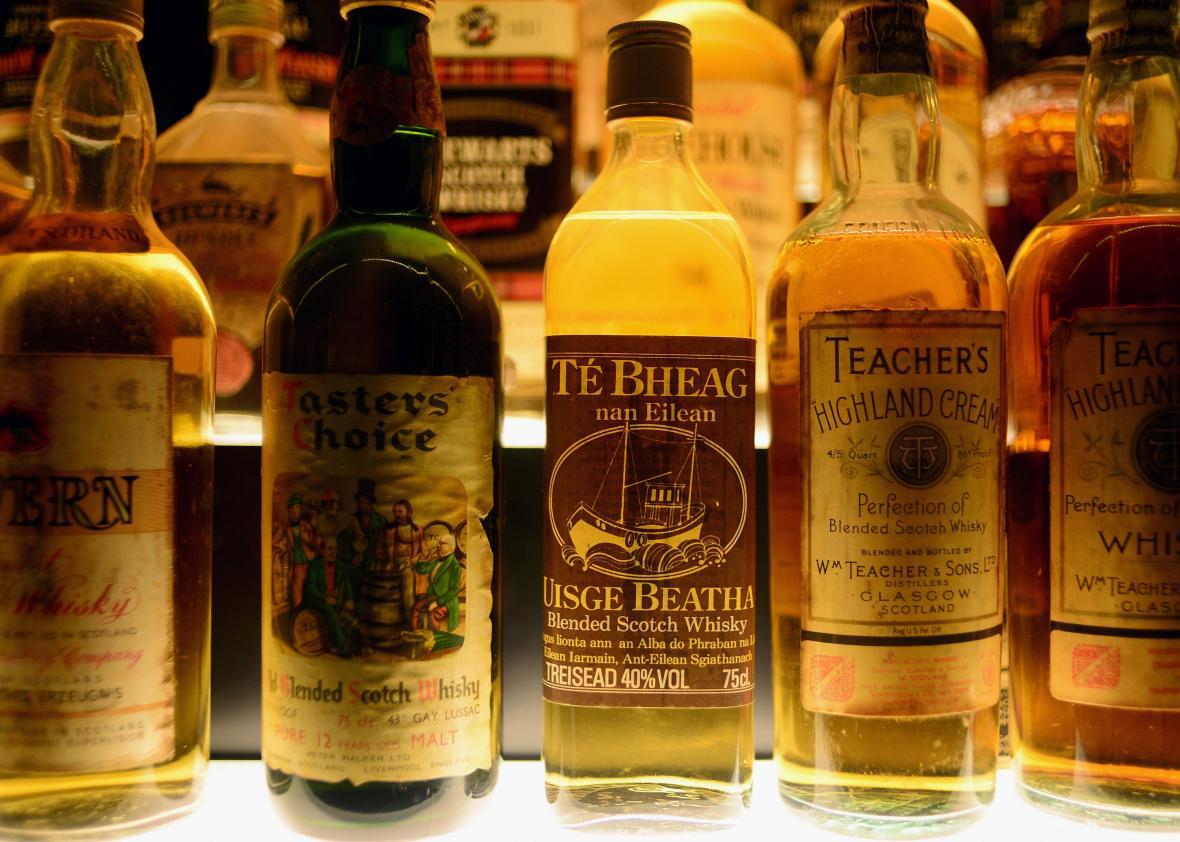Taxing hazardous pleasures like cigarettes and sugary sodas has become a go-to move in the public-health playbook for fairly obvious reasons. It’s both simple—if you make something more expensive, people tend to consume less of it—and a nice source of revenue for the government. Unless you’re a Pepsi fiend or dedicated smoker, that’s a win-win.
In Scotland, however, lawmakers are pursuing a slightly different approach to combating alcohol abuse. Rather than taxing booze, they want to set a minimum price on it. And their efforts have set off a legal battle that has much of the liquor industry on notice.
In recent years, Scotland has been coming to terms with a national drinking problem. The country far out-tipples its U.K. compatriots England and Wales—“themselves no slouches at putting back a pint,” as the Economist has quipped—and suffers 80 percent more alcohol-related deaths than the rest of Great Britain (such mortalities roughly doubled between the 1980s and 2011). Among other culprits, critics tend to pin blame on the wide availability of dirt-cheap, high-gravity beverages—brands like Frosty Jack’s, a 7.5 percent alcohol-by-volume hard apple cider that you can buy in a handy 3-liter bottle for £3.50 (for a U.S. equivalent, think Steel Reserve malt liquor).
Making it more expensive to get a buzz has seemed like an obvious solution. So in 2012, Scotland’s Parliament passed a new law preventing retailers from selling alcohol beverages for anything less than 50 pence per unit of booze—enough to double the cost of a 20-pack of Foster’s, these days.
On first glance, setting a minimum price, instead of just implementing a tax, seems like a somewhat odd choice. After all, slapping a levy on every bottle of Frosty Jack’s would mean more cash in Scotland’s public coffers. Forcing retailers to increase their prices does no such thing. Part of the explanation seems to be that lawmakers didn’t have much choice—the Guardian has noted that, under U.K. law, the Scottish Parliament can’t actually control alcohol taxes. But the government in Holyrood seems to have focused on other justifications. Chief among them: The minimum price scheme lets them target cheap, strong booze while leaving the more expensive liquors presumably favored by moderate drinkers unaffected.
Is the approach a bit classist? Why yes, which may be a bit counterproductive given that even in the U.K., alcohol consumption seems to rise with income rather than fall. But it at least seems to make a certain amount of economic and regulatory sense. Taxing liquor based on price, after all, would penalize expensive, relatively low-alcohol products, while giving an advantage to cheaper, higher-strength drinks. Meanwhile, the government has claimed that a tax based on alcohol content would be “not directly compatible” with the European Union’s excise duty system. Beyond that, taxes aren’t guaranteed to get passed onto the consumer: Retailers and producers can absorb some of the cost. A minimum price obviates that issue.
The minimum price law actually won some support from brewers and bar-owners, who tend to sell more expensive products that wouldn’t be affected by the regulation. Nonetheless, the liquor industry has fought back via a legal challenge brought by the Scotch Whisky Association, which claims, among other things, that the price floor is too broad and violates the EU’s competition rules. Late last year, the European Court of Justice ruled that the law could only stand if Scotland could show the policy was more effective than using a general tax. Hearings on that issue began in Edinburgh this week.
If Scotland prevails, it would be the first whole country to enact a minimum price system (parts of Canada have implemented one already, and have reported some positive public health effects). But, as the Wall Street Journal reported, the alcohol industry is worried that the idea could spread. Ireland is already considering adopting its minimum, as are Wales and Estonia. “If we lose it, I would expect that we will see [minimum pricing] and similar health-justified schemes introduced not just in Scotland but eventually and gradually in many places around the world,” David Frost, chief executive of the Scotch Whisky Association, told the Journal. Unless you’re a distiller, though, that might not be such an awful thing.
